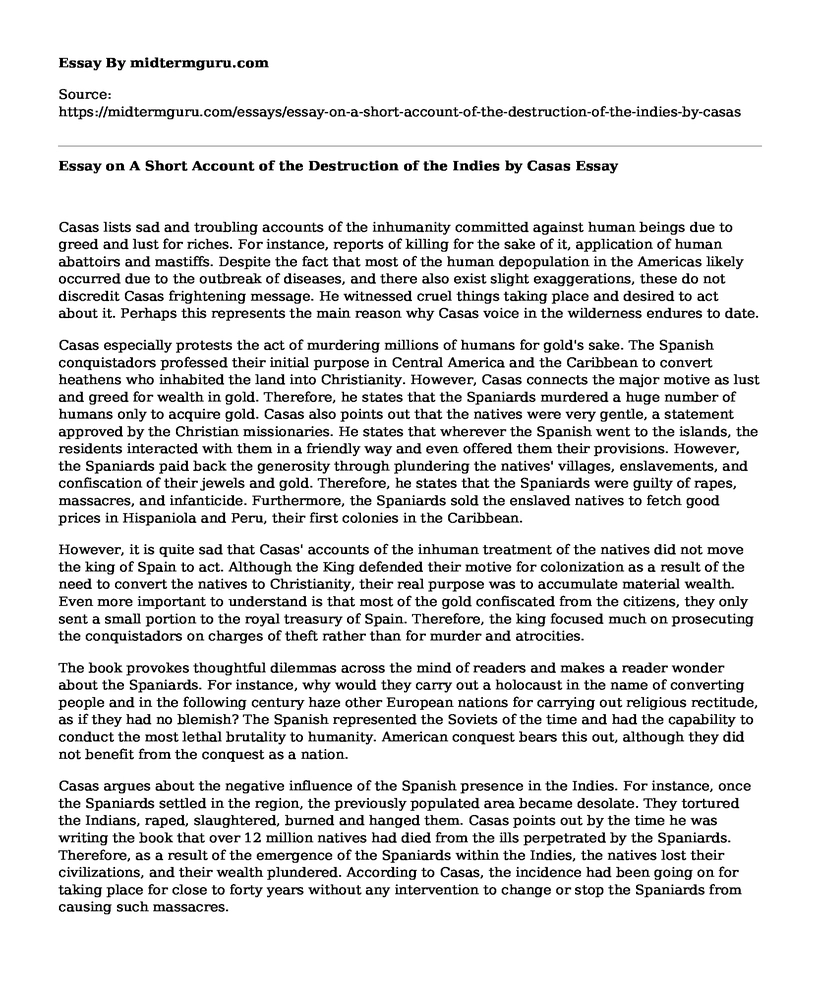Casas lists sad and troubling accounts of the inhumanity committed against human beings due to greed and lust for riches. For instance, reports of killing for the sake of it, application of human abattoirs and mastiffs. Despite the fact that most of the human depopulation in the Americas likely occurred due to the outbreak of diseases, and there also exist slight exaggerations, these do not discredit Casas frightening message. He witnessed cruel things taking place and desired to act about it. Perhaps this represents the main reason why Casas voice in the wilderness endures to date.
Casas especially protests the act of murdering millions of humans for gold's sake. The Spanish conquistadors professed their initial purpose in Central America and the Caribbean to convert heathens who inhabited the land into Christianity. However, Casas connects the major motive as lust and greed for wealth in gold. Therefore, he states that the Spaniards murdered a huge number of humans only to acquire gold. Casas also points out that the natives were very gentle, a statement approved by the Christian missionaries. He states that wherever the Spanish went to the islands, the residents interacted with them in a friendly way and even offered them their provisions. However, the Spaniards paid back the generosity through plundering the natives' villages, enslavements, and confiscation of their jewels and gold. Therefore, he states that the Spaniards were guilty of rapes, massacres, and infanticide. Furthermore, the Spaniards sold the enslaved natives to fetch good prices in Hispaniola and Peru, their first colonies in the Caribbean.
However, it is quite sad that Casas' accounts of the inhuman treatment of the natives did not move the king of Spain to act. Although the King defended their motive for colonization as a result of the need to convert the natives to Christianity, their real purpose was to accumulate material wealth. Even more important to understand is that most of the gold confiscated from the citizens, they only sent a small portion to the royal treasury of Spain. Therefore, the king focused much on prosecuting the conquistadors on charges of theft rather than for murder and atrocities.
The book provokes thoughtful dilemmas across the mind of readers and makes a reader wonder about the Spaniards. For instance, why would they carry out a holocaust in the name of converting people and in the following century haze other European nations for carrying out religious rectitude, as if they had no blemish? The Spanish represented the Soviets of the time and had the capability to conduct the most lethal brutality to humanity. American conquest bears this out, although they did not benefit from the conquest as a nation.
Casas argues about the negative influence of the Spanish presence in the Indies. For instance, once the Spaniards settled in the region, the previously populated area became desolate. They tortured the Indians, raped, slaughtered, burned and hanged them. Casas points out by the time he was writing the book that over 12 million natives had died from the ills perpetrated by the Spaniards. Therefore, as a result of the emergence of the Spaniards within the Indies, the natives lost their civilizations, and their wealth plundered. According to Casas, the incidence had been going on for taking place for close to forty years without any intervention to change or stop the Spaniards from causing such massacres.
Within the book, Casas provides a detailed account of the atrocities committed to the innocent and helpless natives using a descriptive language that intends to appeal and plead with the audience to change the ways of the colonialist. He used various phrases to paint a vivid image of the actions committed against the natives. For instance, he uses emotional and graphical languages to appeal to the pathos of the reader. In fact, the text mainly uses gruesome images that may make it hard to understand in some instances. However, the text has a historical significance since it is a firsthand account of the New World natives and the Europeans, painting the full influence and magnitude of colonialism during the 16th century, which focused on killing and conquering by any available means with the primary motive to acquire material wealth.
Cite this page
Essay on A Short Account of the Destruction of the Indies by Casas. (2021, Jun 10). Retrieved from https://midtermguru.com/essays/essay-on-a-short-account-of-the-destruction-of-the-indies-by-casas
If you are the original author of this essay and no longer wish to have it published on the midtermguru.com website, please click below to request its removal:
- Historical Significance of Harriet Tubman - Essay Example
- Essay on the Art of the First Cities: Mesopotamia
- Critical Essay on Twelve Years a Slave by Solomon Northup
- Teddy Roosevelt: America's Youngest and Most Impactful Leader - Essay Sample
- The Cherokee Trail of Tears: Symbol of Callousness in American History - Essay Sample
- Managers: Key to Business Success Since Industrial Revolution - Essay Sample
- Unveiling Jesus & His Followers in the Roman Empire - Essay Sample







